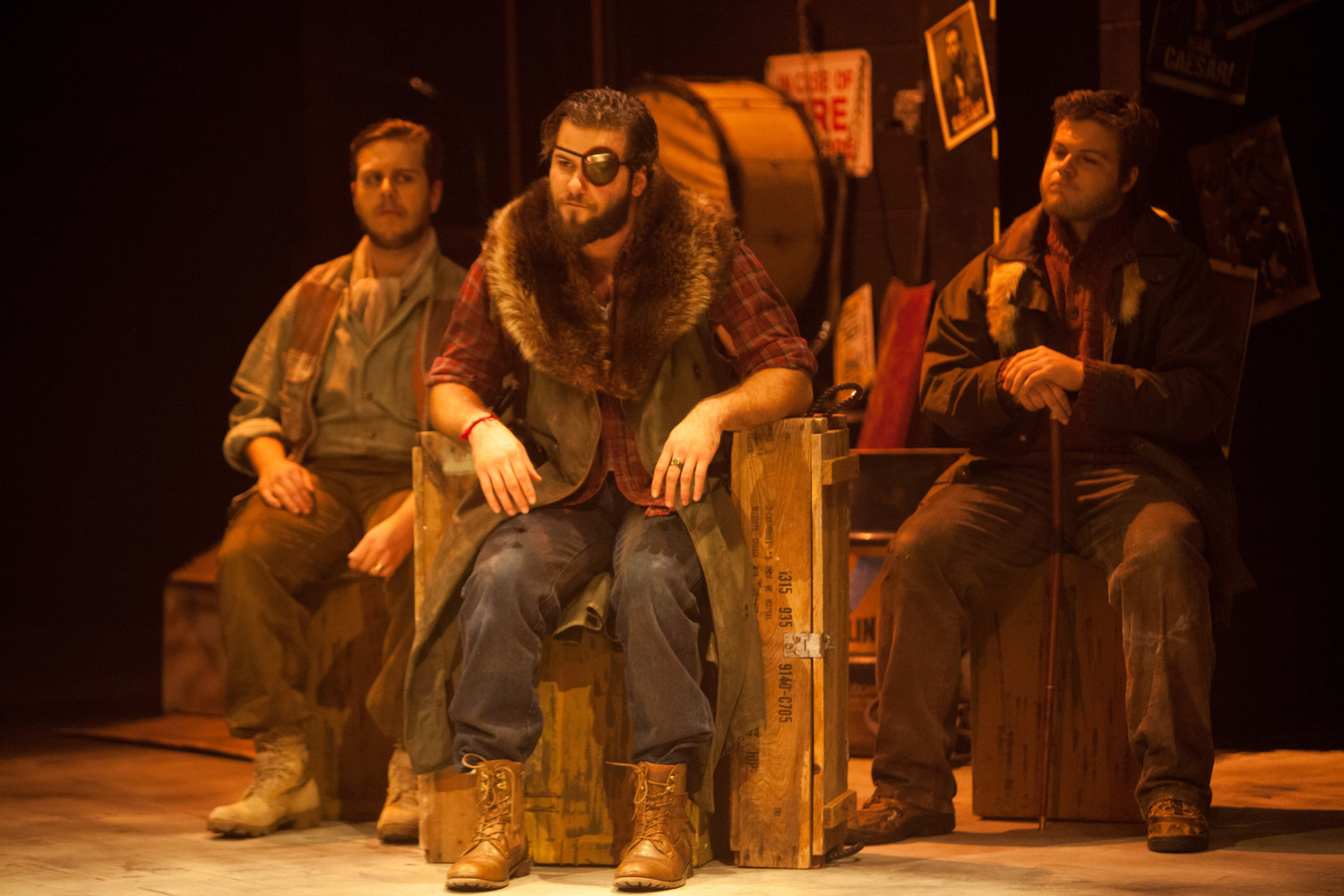Review: JULIUS CAESAR at Nebraska Wesleyan University Theatre and the Power of Words

I am not normally vocal when it comes to politics. I cannot discourse on the merits or shortfalls of government policies or of our leaders. Words are powerful and they don't always bring about the reaction you intend. They can tear apart a country. They can betray a friend.
Shakespeare's JULIUS CAESAR written in 1599 could have been written in 2018. It reaffirms the wisdom of choosing words very carefully because of the resulting destruction they may cause.
It is said that modern adaptations of JULIUS CAESAR have political references pertinent to today. It has been inferred in the past that Caesar could be Margaret Thatcher or Tony Blair. The Guthrie Theatre produced a black Caesar in 2012 suggesting President Obama. And the most recent was the 2017 production at New York's Shakespeare in the Park (Public Theater) that depicted Caesar as President Trump. Critics of the adaptations have warned of the danger of promoting assassination as a means to change. Others have countered that the assassination of Caesar was not promoting violence...it brought about further chaos rather than democracy. The Public Theater put it well by their statement, "those who attempt to defend democracy by undemocratic means pay a terrible price and destroy the very thing that they are fighting to save." Caesar is sacrificed at the hands of his best friend, Brutus, along with conspiratorial senators. The success of their plot did not achieve desired democracy, but more civil war and the death of its citizens.
Production designers Rebecca Armstrong and Simon Brett, Director Ryan Kathman (who also choreographed the realistic fight scenes), and Dramaturg Roger Cognard aided by Adelaide Daniel, put together a powerful production. I was grieved to tears by the violence perpetuated by mobs led by untrustworthy leaders. I admired the skilled actors being able to draw me so completely into post apocalyptic Rome. Cassius (Cat Pestinger), Brutus (Jon Kava), Caesar (Justin Minchow), and Antony (Madeline Lacey) are seriously impressive, and they are supported by a very capable and talented cast. It would be difficult to keep this many characters straight, but the actors are able to distinguish themselves from one another so well, that it was easier than I'd expected. Using a gender blind concept is a novel idea that works without adversely impacting the story at all.
The theatre set designed by Don Harder consists of wooden platforms, barrels, blocks, a statue where only the legs remain, and litter..lots of litter. Posters are defaced by persons waving spray cans of paint. There are gun shots and thunder and a litany of uncomfortable noises that set you on the edge of your seat. Supporters of Caesar celebrate in the streets lifting raucous voices along with their bottles of beer. In the midst of this chaos wanders a musician: a guitarist (Emily Burhani) singing songs of sweet dreams as well as a soothsayer (Jimmy Kohlmann) whose voices go unheard.
Costuming design by Holly Donahue and Ali Lane is just right. The use of buckles and metal rings, neutral colors, mesh and scarves, sleeveless coats and boots, feels modern, and yet apocalyptic. The clothing speaks of destruction and disrepair. It suggests hopelessness. Caesar wears an eye patch, giving him a slightly dangerous look, but also suggesting a weakness.
Following Shakespearean English was somewhat challenging at times, but the actors have rehearsed to the point that the words flow effortlessly off their tongues with excellent enunciation. Their gestures and movements emphasize their words making them all the more understandable.
It is critical that we understand those words. The words are timeless. Cassius sways Brutus with her words disparaging Caesar and with forged letters (fake news) from Rome's citizens. She uses her words to promote rebellion. She likens Caesar to open graves and a roaring lion. Casca (Natalia Spengler) uses words to impugn the citizens. She calls them "rabblement" and uses adjectives such as chapped, sweaty, and stinking to make their loyalty to Caesar null and void.
Decius Brutus (Mackenzie Davenport) brags that he can "o'ersway him; for he loves to hear that unicorns may be betray'd with trees." Flattery can be a tool. Metellus Cimber (Brian Hannah) calls for including Cicera (Emma Evenson) because her silver hair will buy men's voices to commend their deeds.
Cassius warns Brutus, "Do not consent that Antony speak in his (Caesar's) funeral: Know you how much the people may be moved by that which she will utter?" And Antony cleverly uses her words of sarcasm to change the minds of the public and incite them against the noble Brutus.
The ending is abrupt, leaving me feeling as if a hollow point bullet had pieced my body. I left the theatre stifling tears. Well done, NWU, for tearing a hole in my heart. This is what theatre is--making you feel. Making you think. You've done that. You've used your words wisely.
JULIUS CAESAR runs NOV 1-3 at 7:30 pm and NOV 4 at 2:00 pm at McDonald Theatre at Nebraska Wesleyan University in Lincoln, NE.
theatre@nebrwesleyan.edu
402-465-2384
Photo courtesy of NWU Theatre.
Reader Reviews

Videos
